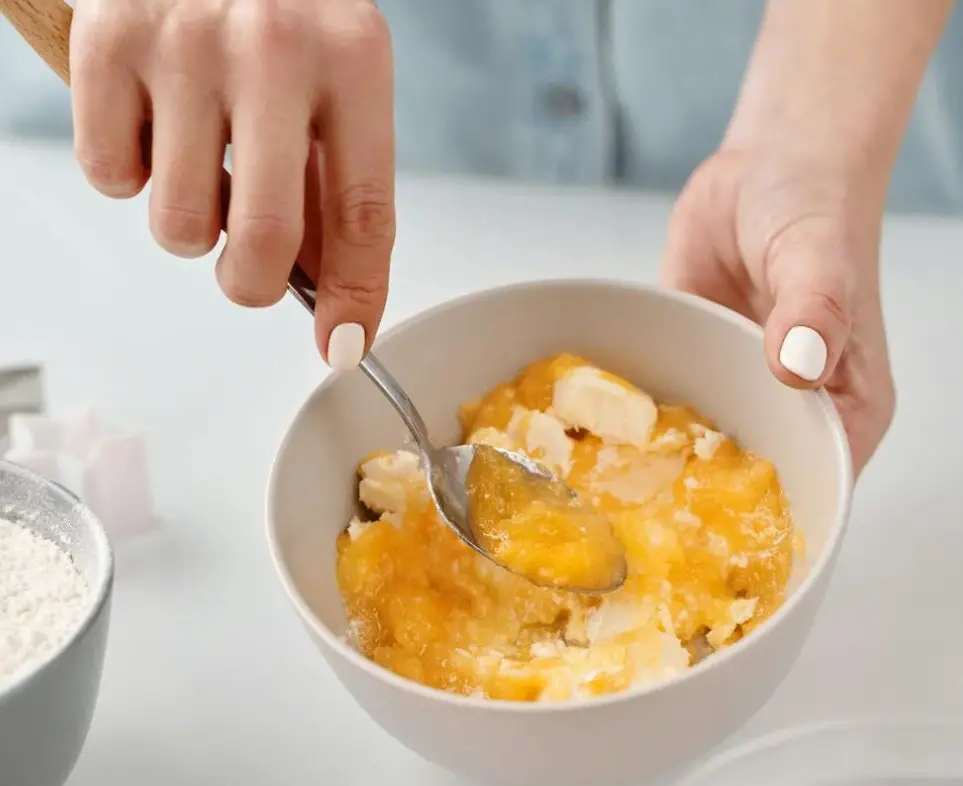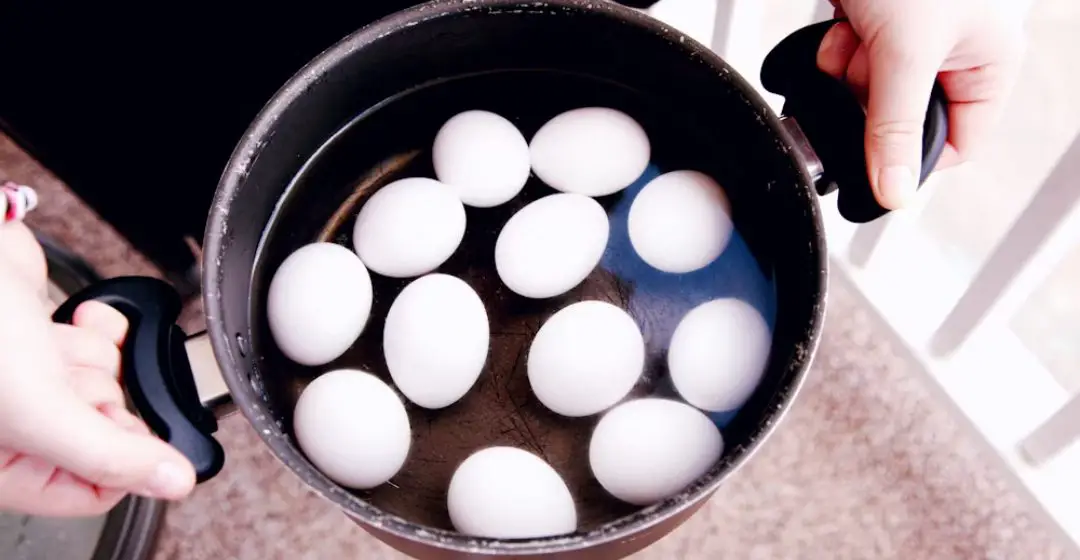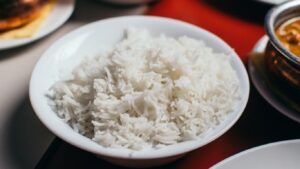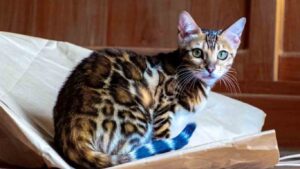Are you a proud Bengal cat owner, and wondering if it’s acceptable to feed your boiled eggs to your curious Bengal cat? Well, you are in luck!
In this brief and informative blog post, I’ll look into whether Bengal cats can eat the protein-rich goodness of cooked eggs.
Prepare to uncover the truth and see if this nutritious treat is the ideal addition to your Bengal cat’s diet!
Are Eggs Safe for Bengal Cats?
Yes, eggs are safe for Bengal cats to eat. They can enjoy boiled and plain scrambled eggs as a nutritious treat, but it’s important to cook or scramble the eggs before feeding them to your cat.
Remember to remove the shell and avoid adding any seasonings or additives.
Can Bengal Cats Eat Boiled Eggs
Yes, you can feed boiled eggs to Bengal cats in moderation. For Bengal cats, boiled eggs are a great source of protein and vital elements.
It’s crucial to gradually introduce boiled eggs to your Bengal cat diet and keep an eye out for any allergic reactions or stomach problems.
Some Bengal cats can be allergic to eggs or chicken, so it’s always a good idea to keep an eye on your Bengal cat after feeding them with eggs.
If they respond to eggs negatively, like showing signs of allergies, you have to stop feeding them eggs and talk to your vet.
Let’s get started…
Benefits of Boiled Eggs for Bengal Cats
When it comes to the benefits of boiled eggs for Bengal cats, there’s more than meets the eye!
First of all, protein is crucial for the growth of your cat’s muscles and general health, and eggs are a great source of it.
Additionally, they offer vital vitamins like D and B12, which support healthy bones and a robust immune system.
Furthermore, in eggs, the Omega-3 fatty acids help support healthy skin and a glossy coat.
Just make sure your Bengal cat’s diet is balanced and that you provide boiled eggs sparingly, as it’s a good choice.
So go ahead and give your Bengal cat a delicious and wholesome snack of boiled eggs!
Risks and Considerations of Boiled Eggs for Bengal Cats
Though Bengal cats might enjoy cooked eggs as a treat, it’s important to be aware of potential risks and measures.
First of all, keep in mind that salt and seasonings might be detrimental to your feline companions when added to cooked eggs.
After adding eggs to your cat’s diet, keep an eye out for any indications of allergies or digestive problems.
Always keep in mind that cooked eggs are to be fed sparingly and shouldn’t take the place of a well-balanced cat diet.
For advice on the right amount and frequency, speak with your veterinarian or other experienced Bengal cat owners.
You and your Bengal cat can safely indulge in the occasional egg-citing treat when you take the right precautions!
Portion Sizes and Frequency of Egg Consumption for Bengal Cats
When it comes to feeding your Bengal cat eggs, it’s important to consider portion sizes and frequency.
Eggs can be a great source of protein and other nutrients, but too much can lead to imbalances in their diet.
Aim for small portions, like a quarter to half of a scrambled or boiled egg, a few times a week. Keep an eye on your Bengal cat’s response and adjust accordingly.
Preparing Boiled Eggs for Bengal Cats

Here’s a step-by-step guide on how to prepare boiled eggs for your Bengal cats:
Step 1: Gather the necessary ingredients and equipment – To prepare boiled eggs for your Bengal cats, you will need fresh eggs, a pot, water, and a stove. Make sure the eggs are clean and free from any cracks.
Step 2: Place the eggs in a pot – Take the pot and carefully place the eggs in it. Make sure not to overcrowd the pot so that the eggs have enough space to cook evenly.
Step 3: Add water – Fill the pot with enough water to cover the eggs completely. It’s important to have enough water to ensure even cooking.
Step 4: Heat the pot – Place the pot on the stove and turn the heat to medium-high. Allow the water to come to a gentle boil. This may take a few minutes.
Step 5: Set the timer – Once the water is boiling, set a timer based on the desired level of doneness. For soft-boiled eggs, set the timer for 4–6 minutes. For hard-boiled eggs, set the timer for 8–10 minutes.
Step 6: Cook the eggs – Let the eggs cook in the boiling water for the set amount of time. Make sure to monitor the heat and adjust it as needed to maintain a gentle boil.
Step 7: Prepare an ice bath – While the eggs are cooking, fill a bowl with ice and cold water to create an ice bath. This will help stop the cooking process and cool the eggs quickly.
Step 8: Transfer the eggs to the ice bath – Once the timer goes off, carefully remove the eggs from the pot using tongs or a slotted spoon and immediately place them into the ice bath. Let them sit for a few minutes to cool down.
Step 9: Peel the eggs – If you prefer to serve your Bengal cats peeled eggs, you can now gently tap the egg on a hard surface to crack the shell, and then peel it off. However, some cats enjoy playing with the whole egg, including the shell, so you can leave it intact if your cat prefers.
Step 10: Serve – Once the eggs are cooled and peeled (if desired), you can serve them to your Bengal cats. Cut the eggs into small, cat-sized pieces to make it easier for them to eat. Always monitor your cats while they are eating to ensure they are chewing properly and not choking.
Find out more about how much to feed your Bengal cat per day.
How to Serve Boiled Eggs to Bengal Cats
As a cat owner, I do feed boiled eggs to my cats in two methods, which are as follows:
Method 1: As a Treat
You can use the above steps to prepare the eggs or follow this steps:
Step 1: Choose the Right Egg – Start by selecting fresh eggs from a reliable source. Organic, free-range eggs are preferable, as they are generally healthier and free from harmful additives.
Step 2: Boiling the Egg – Place the egg in a saucepan and cover it with cold water. Bring the water to a boil over medium heat.
Once the water reaches a rolling boil, reduce the heat to low and let the egg simmer for about 9-12 minutes. This will result in a hard-boiled egg with a fully cooked yolk.
Step 3: Cooling and Peeling – After boiling, remove the egg from the saucepan and let it cool. Once it has reached room temperature, gently tap the egg on a hard surface to crack the shell. Carefully peel off the shell, ensuring no fragments remain.
Here’s the real deal…
Step 4: Serving – Cut the boiled egg into small, bite-sized pieces. Bengal cats have relatively small mouths, so smaller portions are easier for them to eat.
Place the pieces in your Bengal cat’s food bowl or offer them as a hand-fed treat.
Remember, moderation is key—eggs should be served as an occasional treat and not as a substitute for a balanced diet.
Method 2: As Part of a Meal

Step 1: Egg Preparation – Follow the same steps as Method 1 to boil and peel the egg.
Step 2: Mixing with Cat Food – Once the boiled egg is peeled and cooled, mash it thoroughly using a fork or a food processor.
Mix the mashed egg with your Bengal cat’s regular wet or dry cat food. Start with small amounts to gauge your Bengal cat’s interest, and gradually increase the quantity if they enjoy it.
Step 3: Feeding – Serve the egg and cat food mixture in your Bengal cat’s regular food bowl. Ensure that the mixture is well incorporated with the cat food so that your Bengal cat gets a balanced meal.
Monitor your cat’s response to the new addition to their diet and consult your veterinarian if you have any concerns.
Find out more about other human food Bengal cats can eat.
Conclusion
In a nutshell, boiled eggs can be a healthy and safe treat for Bengal cats, but it’s crucial to introduce them gradually and keep an eye out for any indications of gastrointestinal problems or allergies. Before making any dietary adjustments for your pet, always get advice from your veterinarian. Keep in mind that a well-fed Bengal cat is happy and healthy, so select their food carefully and enjoy the purrs of happiness!
Find out more about food Bengal cats shouldn’t eat.
Questions
Let’s answer some common questions:
Can Bengal cats safely eat boiled eggs?
Yes, Bengal cats can safely eat boiled eggs as an occasional treat. Eggs are a good source of protein and can provide essential nutrients for your feline friend. However, it’s important to introduce eggs gradually and watch for any signs of allergies or digestive issues.
How should I feed boiled eggs to my Bengal cat?
To feed boiled eggs to your Bengal cat, start by boiling the eggs until they are fully cooked. Allow them to cool before removing the shell and cutting the egg into small, bite-sized pieces. Offer a small portion as a treat and observe how your cat reacts. If there are no adverse reactions, you can continue to offer boiled eggs occasionally as part of a balanced diet.
Are there any risks or precautions when feeding boiled eggs to Bengal cats?
While boiled eggs are generally safe for Bengal cats, it’s important to take some precautions. Avoid adding any seasoning or salt to the eggs, as these can be harmful to cats. Additionally, always monitor your cat for any signs of allergies or digestive issues after introducing eggs into their diet. If you notice any adverse reactions, consult with your veterinarian.
Can boiled eggs be a regular part of a Bengal cat’s diet?
Boiled eggs should be given to Bengal cats as an occasional treat rather than a regular part of their diet. While eggs can provide nutritional benefits, they should not replace a balanced and complete cat food. Consult with your veterinarian to determine the appropriate frequency and portion size of boiled eggs for your Bengal cat.









